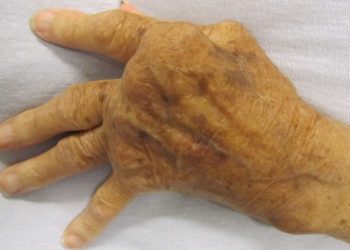Tofacitinib superior to methotrexate monotherapy for rheumatoid arthritis
1. At 6 months, patients receiving tofacitinib monotherapy had reduced structural joint damage compared to methotrexate monotherapy.
2. Patients treated with tofacitinib had increased numbers of adverse events, including herpes zoster infections and creatinine and lipid elevations.
Evidence Rating Level: 1 (Excellent)
Study Rundown: This randomized, controlled study was designed to compare the efficacy and safety profile of tofacitinib, an oral Janus kinase inhibitor, to first-line methotrexate monotherapy in the treatment of rheumatoid arthritis. The study involved three arms (tofacitinib at 5 and 10 mg daily versus methotrexate at 10 mg per week, with ability to increase to max of 20 mg per week) and continued for 2 years, though primary endpoints were powered for measurements at the 6 month time point. At 6 months, there was a significant improvement in the primary outcome measures for the tofacitinib groups versus methotrexate monotherapy. The mean change from baseline in a summary measure of radiographic evidence of joint destruction (van der Heijde modification of the total Sharp score) was smaller in the tofacitinib groups, and there was significant clinical improvement in arthritis symptoms. Importantly, however, while the difference in the Sharp score was statistically significant, the absolute changes were less than the minimal clinically important difference.
Strengths of the study include the randomized design, as well as the ability to see significant differences across a follow-up time of 2 years. Drawbacks include the inability to adjust medication dosages more frequently than every 3 months (which has been recommended) and the fact that the population was somewhat heterogeneous in terms of interval between diagnosis of rheumatoid arthritis and enrollment in the trial (less than 2 years for 65.5% of patients). The study was funded by Pfizer, the maker of tofacitinib.
Click to read the study, published today in NEJM
Relevant Reading: Therapeutic strategies for rheumatoid arthritis
In-Depth [randomized controlled study]: This randomized controlled study involved 958 patients randomized to three arms: 1) tofacitinib 5 mg twice daily, tofacitinib 10 mg twice daily, or methotrexate at a starting dose of 10 mg per week (with maximum achievable dose 20 mg per week). Eligible patients were at least 18 years old, with a diagnosis of active rheumatoid arthritis (RA), elevated inflammatory markers (ESR>28 mm/hour or CRP>7 mg/L), and either radiographic evidence of joint erosions or positive rheumatoid arhtiritis antibody titers. They had not received methotrexate before.
The primary endpoints at month 6 were mean change from baseline on a standardized scoring system for radiographic joint damage (van der Heijde modification of the total Sharp score, scale from 0 to 448 with higher scores indicating greater joint damage) and the proportion of patients with at least a 70% reduction from baseline in the number of both tender and swollen joints and equivalent improvement in American College of Rheumatology (ACR)-defined clinical measures of disease severity (ACR 70 response). At 6 months, the least-squares mean changes (±SE) in the Sharp score were 0.2±0.1 points in the 5 mg tofacitinib group, <0.1±0.2 points in the 10 mg tofacitinib group, and 0.8±0.2 points in the methotrexate group (P<0.001 for both comparisons to methotrexate). These significant differences persisted at 12 and 24 months. At 6 months, the mean proportions of patients who had an ACR 70 response were 25.5%, 37.7%, and 12% in the 5 mg tofacitinib, 10 mg tofacitinib, and methotrexate groups respectively (P<0.001 for both comparisons to methotrexate).
The most common adverse events were infections and gastrointestinal disorders. Herpes zoster infections occurred in 3.5% of the 5 mg tofacitinib group, 4.5% of the 10 mg tofacitinib group, and 1.1% of the methotrexate group. There were 6 confirmed cases of cancer (5 between the 2 tofacitinib groups vs. 1 in the methotrexate group). There were also greater increases in serum creatinine levels, LDL and HDL lipoprotein cholesterol levels, and aminotransferase levels in the tofacitinib groups compared to the methotrexate group.
More from this author: Hemicraniectomy improved survival but not functional status in MCA strokes, Broad decline in incidence rate of diabetes-related complications in US, Darapladib not effective in optimized, stable coronary heart disease patients, Letermovir safe, effective in CMV prophylaxis following stem-cell transplantation, Combination CPAP, weight loss for obstructive sleep apnea offer no added benefit
Image: PD
©2012-2014 2minutemedicine.com. All rights reserved. No works may be reproduced without expressed written consent from 2minutemedicine.com. Disclaimer: We present factual information directly from peer reviewed medical journals. No post should be construed as medical advice and is not intended as such by the authors, editors, staff or by 2minutemedicine.com. PLEASE SEE A HEALTHCARE PROVIDER IN YOUR AREA IF YOU SEEK MEDICAL ADVICE OF ANY SORT.







